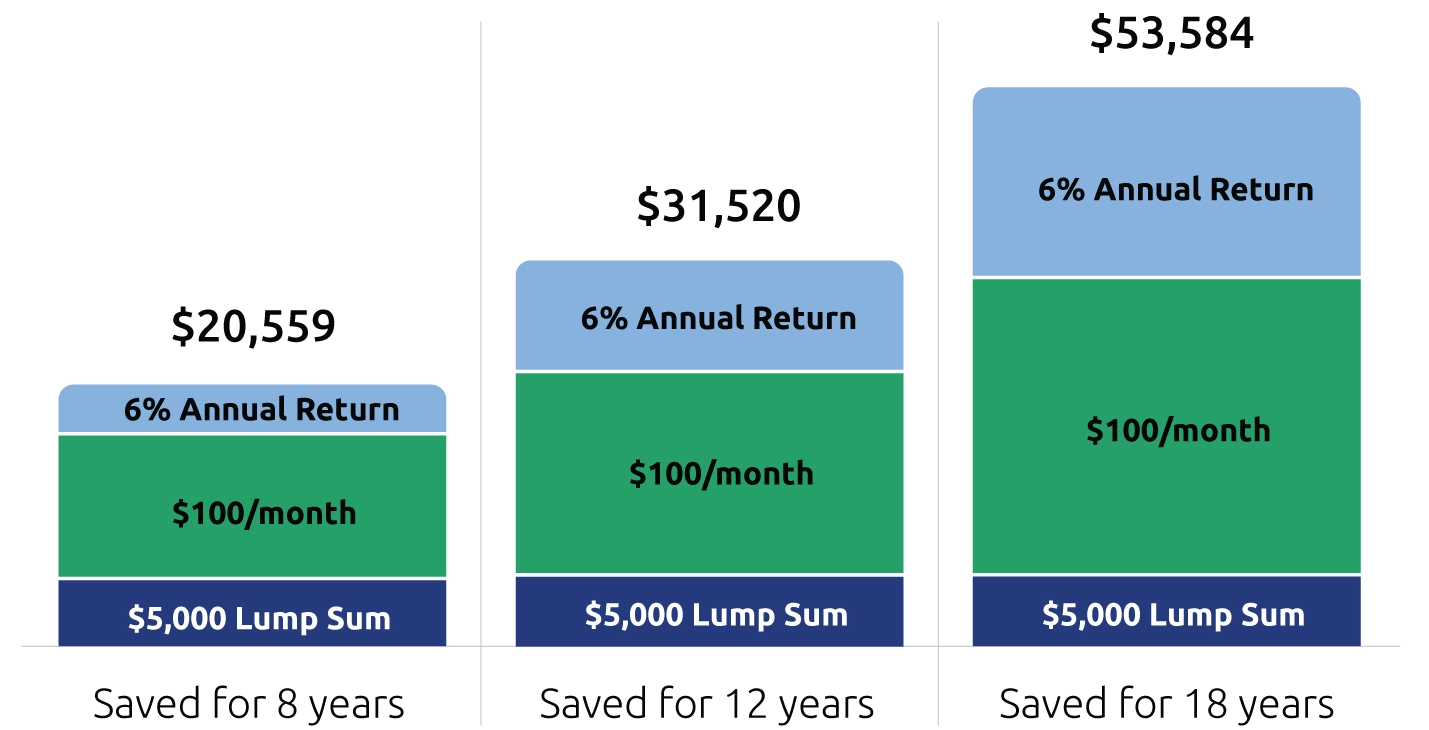Get to know MESP
How Our 529 Plan Works
No matter your child’s age, the best time to open an MESP account is “today.” Because the sooner you start, the more you can take advantage of compound earnings and unique tax benefits.
Start early to make the most of your savings
Saving early has the potential to deliver compounding earnings over a longer period of time.
 529 fact
529 fact
Help grow your savings with gifts from friends and family using Ugift®.
Advantages of Starting Early
See how your savings might have grown if you started with $5,000 and continued to save $100 a month for 8, 12 and 18 years.
- Earnings
- Subsequent Contributions
- Initial Contribution

Save for 8 years
- Earnings: 6% Annual Return
- Subsequent Contributions: $100 per month
- Initial Contribution: $5,000 Lump Sum
- Total savings growth over time: $20,559
Save for 12 years
- Earnings: 6% Annual Return
- Subsequent Contributions: $100 per month
- Initial Contribution: $5,000 Lump Sum
- Total savings growth over time: $31,520
Save for 18 years
- Earnings: 6% Annual Return
- Subsequent Contributions: $100 per month
- Initial Contribution: $5,000 Lump Sum
- Total savings growth over time: $53,584
Graph Footnotes
- This chart assumes a $5,000 lump sum investment, a $100 monthly investment and 6% annual rate of return. The calculations are for illustrative purposes only, and the results are not indicative of the performance of any investments. The calculations do not reflect any plan fees or charges that may apply. If such fees or charges were taken into account, returns would have been lower. With any long-term investment, investment return may vary. Such automatic investment plans do not assure a profit or protect against losses in declining markets. Account value in the investment options is not guaranteed and will fluctuate with market conditions.
How much should you save towards your child’s tuition?
Get a quick estimate of approximately how much you’ll need to save using our calculator tool.
Estimate your savings
Unique tax benefits
When you pay fewer taxes, you can potentially earn more and grow your account faster—giving your child or grandchild an even bigger head start. MESP offers compelling income tax benefits.
- Individual taxpayers may deduct up to $5,000 in MESP contributions each year from their Michigan adjusted gross income, and taxpayers filing jointly may deduct up to $10,000.
- Investment earnings are 100% free from federal and state taxes when used for qualified education expenses.1
See the MESP Program Description for more details on our unique tax benefits.
WHO’S ELIGIBLE?
You, your friends, family, neighbors, and more…basically any citizen or taxpayer over 18 can open or contribute to MESP. Here are the details.
Account owners
- At least 18 years old with a valid Social Security Number (SSN) or Taxpayer ID Number
- Person opening the account can designate a successor account owner in the event of their death
- Certain trusts, estates, and corporations can also open an account with a valid taxpayer ID number*
Account Owner Footnote
- *Additional restrictions may apply; please refer to the Program Description for details.↩
Beneficiaries
- The beneficiary is the student and only needs a valid SSN or taxpayer ID number
- It can be your child, grandchild, even you—and you don’t need to be related to the beneficiary
- Only one beneficiary to an account, except when an entity creates a general scholarship account
Contributors
- Anyone can help pay for college with our easy and secure Ugift® platform
- Gifting may also provide advantages for estate and legacy planning; please consult your tax advisor2
An account can be opened in anyone’s name (like a parent, grandparent, or family friend) and easily transferred later.

Qualifying Expenses
With MESP, you have full control over how to use your funds. Here are the wide variety of qualified education expenses that can support your child in any path they choose to take:
- Tuition at any accredited private or public college or university, community college, trade school, graduate schools, and professional schools across the US and many abroad
- Certain room and board related expenses
- Fees, books, supplies and other equipment needed for enrollment and attendance
- Computers and related technology such as internet access fees, software or printers
- Certain additional enrollment and attendance costs for beneficiaries with special needs
- Pay for K-12 tuition expenses at a public, private or religious elementary, middle, or high school—up to $10,000 annually Federal Tax free3
- Pay for apprenticeship expenses Federal Tax free—Apprenticeship programs must be registered and certified with the Secretary of Labor under the National Apprenticeship Act.3
Funds can also be used in two other helpful ways:
- Repay student loans—up to a $10,000 lifetime limit per individual (including principal and interest on any qualified education loan)3
- Transfer additional/leftover funds to another eligible beneficiary such as another child, grandchild, or even yourself
Please see the state tax treatment of withdrawals section in the Program Description for more information.
See plan details for additional information
Have more questions?
No. Your MESP funds can be used at any accredited university in the country—and even some abroad. This includes public and private colleges and universities, apprenticeships, community colleges, graduate schools and professional schools.1 Up to $10,000 annually can be used toward K-12 tuition (per student).1 In addition, your 529 can be used for student loan repayment up to $10,000 lifetime limit per individual.1 Review a list of qualifying expenses and the state tax treatment of withdrawals for these expenses in the Program Description.
Footnotes
- 1Withdrawals for tuition expenses at a public, private or religious elementary, middle, or high school, can be withdrawn free from federal taxes. For Michigan taxpayers, these withdrawals are subject to recapture of Michigan income tax deduction and state income tax on the earnings. Registered apprenticeship programs and student loan repayment can be withdrawn free from federal and Michigan income tax. You should talk to a qualified professional about how tax provisions affect your circumstances.↩
With your MESP account, you’re never locked in. You’ll always have access to several options for this money:
- Your funds can be used to pay for a variety of eligible education expenses, including at any accredited college, university, apprenticeships, community college or postgraduate program in the United States—and even some schools abroad.1
- Your 529 can be used for student loan repayment up to $10,000 lifetime limit per individual.1
- Up to $10,000 annually can be used toward K-12 tuition (per student).1
- You can transfer the funds to another eligible beneficiary, such as another child, a grandchild or yourself.
- If you just want the money back, you can withdraw the funds at any time. If funds are withdrawn for a purpose other than qualified higher education expenses, the earnings portion of the withdrawal is subject to federal and state taxes plus a 10% additional federal tax on earnings (known as the “Additional Tax”). See the Program Description for more information and exceptions.
Footnotes
- 1Withdrawals for tuition expenses at a public, private or religious elementary, middle, or high school, can be withdrawn free from federal taxes. For Michigan taxpayers, these withdrawals are subject to recapture of Michigan income tax deduction and state income tax on the earnings. Registered apprenticeship programs and student loan repayment can be withdrawn free from federal and Michigan income tax. You should talk to a qualified professional about how tax provisions affect your circumstances.↩
Your MESP account can be used at eligible colleges, universities, vocational schools, community colleges, graduate or postgraduate programs, apprenticeships and more.1 Contact your school to determine whether it qualifies as an eligible educational institution or use the Federal School Code Search tool on the Free Application for Federal Student Aid (FAFSA) website.
Footnotes
- 1Registered apprenticeship programs and student loan repayment can be withdrawn free from federal and Michigan income tax. You should talk to a qualified professional about how tax provisions affect your circumstances.↩
There are no sales charges, startup fees or maintenance fees associated with MESP accounts. For details on total annual asset-based fees, comprised of the underlying investment expenses for each investment option, the program manager fee and state administration fee, review the individual investment options Fee Table in the Program Description.
